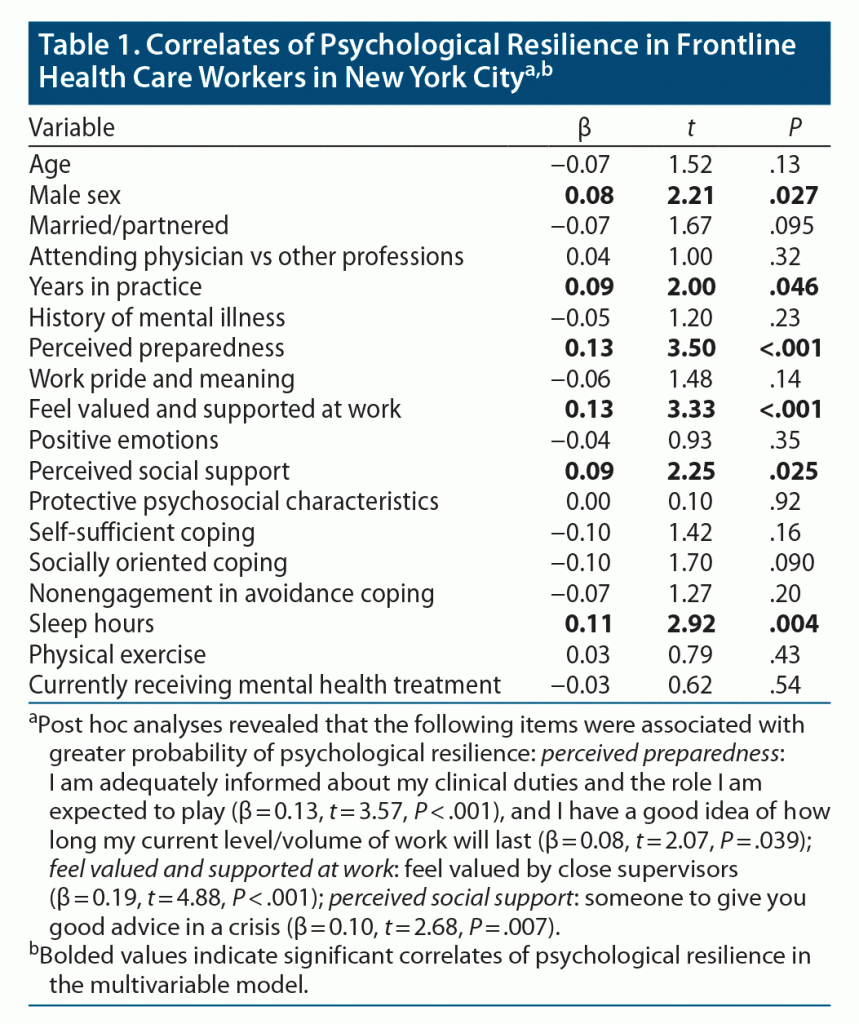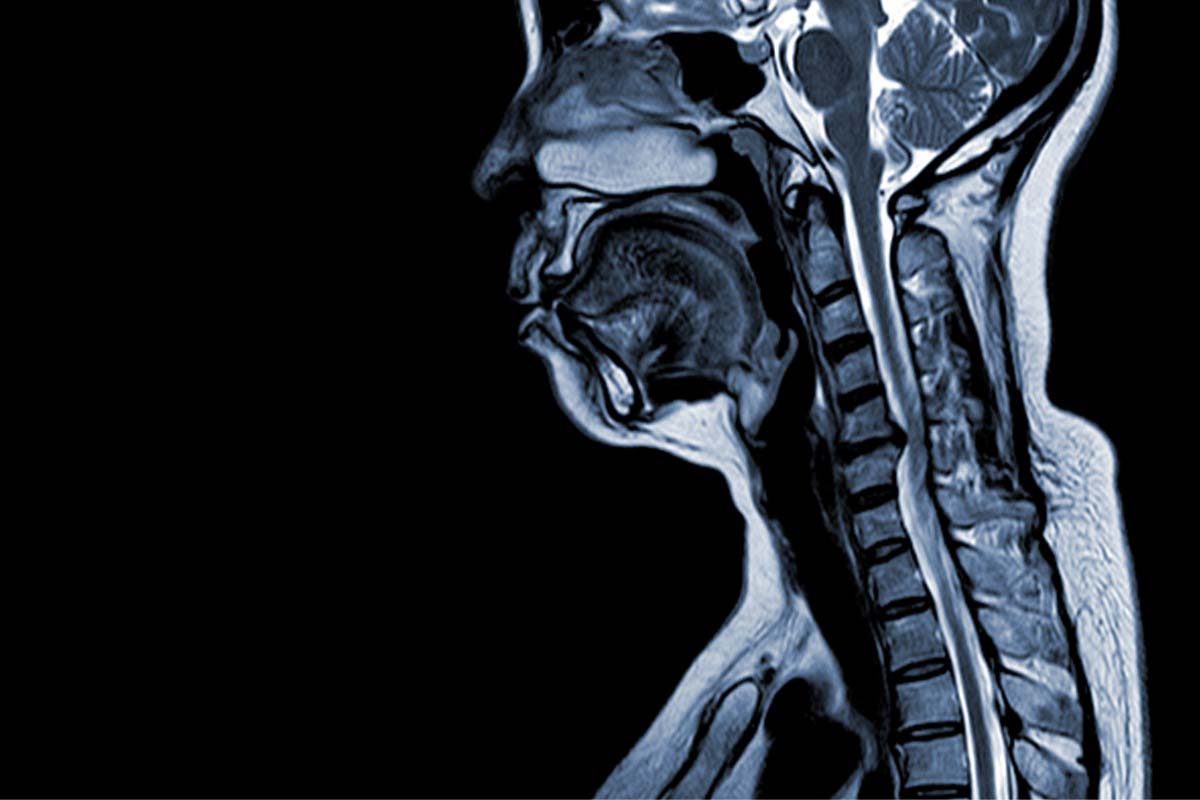
Prim Care Companion CNS Disord 2022;24(5):22br03342
To cite: Pietrzak RH, Feder A, Feingold JH, et al. Resilience in the face of the COVID-19 crisis: a prospective cohort study of frontline health care workers in New York City. Prim Care Companion CNS Disord. 2022;24(5):22br03342.
To share: https://doi.org/10.4088/PCC.22br03342
© 2022 Physicians Postgraduate Press, Inc.
aUS Department of Veterans Affairs National Center for Posttraumatic Stress Disorder, VA Connecticut Healthcare System, West Haven, Connecticut
bDepartment of Psychiatry, Yale School of Medicine, New Haven, Connecticut
cDepartment of Social and Behavioral Sciences, Yale School of Public Health, New Haven, Connecticut
dDepartment of Psychiatry, Icahn School of Medicine at Mount Sinai, New York, New York
eDepartment of Medical Education, Icahn School of Medicine at Mount Sinai, New York, New York
fDepartment of Medicine, Icahn School of Medicine at Mount Sinai, New York, New York
gOffice of Well-Being and Resilience, Icahn School of Medicine at Mount Sinai, New York, New York
*Corresponding author: Robert H. Pietrzak, PhD, MPH, US Department of Veterans Affairs National Center for Posttraumatic Stress Disorder, VA Connecticut Healthcare System, 950 Campbell Ave 151E, West Haven, CT 06516 ([email protected]).
Frontline health care workers (FHCWs) endured unprecedented exposure to illness and death, work-life balance interruption, and perilous working conditions during the height of the coronavirus disease 2019 (COVID-19) pandemic. These experiences have been linked to elevated rates of depression, anxiety, and burnout,1 as well as job turnover.2
While the prevalence and burden of mental health difficulties in FHCWs have been investigated, scarce research has examined the prevalence and correlates of psychological resilience, defined as adapting well in the face of high pandemic-related stressors, in this population. This information is critical to informing prevention and treatment efforts designed to promote and maintain the mental health of FHCWs, as well as to prepare for subsequent disaster response efforts.
Using data from FHCWs working at a large tertiary urban hospital in New York City, we previously found that positive emotions, self-efficacy, and nonengagement in substance use served as the coping strategies that correlated most strongly with resilience during the spring 2020 acute phase of the COVID-19 pandemic.3 Here, we have sought to extend these findings by examining the prevalence and correlates of resilience over time in this cohort.
METHODS
Participants included 786 FHCWs working at Mount Sinai Hospital, New York, New York, who participated in 2 anonymous surveys over time. The first survey was administered during the middle and downward slope of the initial pandemic peak in April–May 2020 (time 1 [T1]) and the second at a 7-month follow-up between November 2020 and January 2021 (time 2 [T2]), which corresponded with the subsequent rise and plateau of the second pandemic surge in New York City, as indicated by inpatient census data (Supplementary Material).
Psychological resilience was operationalized as a low probability of screening positive for pandemic-related posttraumatic stress, major depressive, and generalized anxiety disorder symptoms in the presence of high exposure to pandemic-related stressors at T1 and T2 (Supplementary Material).4 Logistic regression and relative importance analyses were conducted to identify T1 variables associated with resilience scores.
RESULTS
Of 393 FHCWs with greater than the median number of pandemic-related exposures and stress (2.3 SDs higher), 179 (45.5%) demonstrated resilience by having no positive screens for psychological outcomes at T1 or T2.
Male sex, more years in practice, greater perceived preparedness, feeling valued and supported at work, perceived social support, and sleep hours assessed at T1 were all independently associated with a greater probability of resilience over the study period (total R2 = 0.32, Table 1).
Relative importance analysis further indicated that feeling valued by one’s close supervisor (34% relative variance explained [RVE]), being adequately informed about one’s clinical duties and role (24% RVE), and a greater number of sleep hours (17% RVE) during the pandemic surge were most strongly associated with resilience, accounting for 75% of the explained variance in this outcome.
DISCUSSION
Results of our prospective cohort study of FHCWs conducted during the COVID-19 pandemic build on our initial findings3 and suggest that 45% of FHCWs who were highly exposed to pandemic stressors remained psychologically resilient. They further reveal that feeling valued by one’s close supervisor and being adequately informed about clinical duties and role, as well as a greater number of sleep hours during the initial pandemic surge, were most strongly associated with resilience over the 7-month study period.
Taken together, results of this study suggest that organizational and personal factors are likely associated with resilience to pandemic-related stress in FHCWs. Accordingly, they highlight the importance of organizational efforts designed to enhance a sense of being valued and robust authentic communications during disaster response.5 Additionally, workplace interventions to bolster sleep health6 during large-magnitude disasters may be beneficial. Further research is needed to evaluate the effectiveness of such interventions to promote resilience for current and future generations of the health care workforce.
Submitted: June 22, 2022; accepted August 19, 2022.
Published online: October 4, 2022.
Relevant financial relationships: Dr Pietrzak is a research consultant to the Office of Well-Being and Research at Icahn School of Medicine at Mount Sinai (ISMMS). Dr Feder is named co-inventor on an issued patent in the US, and several issued patents outside the US, filed by ISMMS for the use of ketamine as a therapy for PTSD; this intellectual property has not been licensed. Drs Feingold, Peccoralo, and Ripp report no relevant financial relationships.
Funding/support: This study was supported by internal funding devoted to COVID-19–related projects from the Icahn School of Medicine at Mount Sinai. Preparation of this report was supported in part by the US Department of Veterans Affairs National Center for Posttraumatic Stress Disorder (Dr Pietrzak). Dr Feingold was funded by TL1 grant TR001434.
Role of the sponsor: The funders had no role in the design and conduct of the study; collection, management, analysis, and interpretation of the data; preparation, review, or approval of the manuscript; or decision to submit the manuscript for publication.
Acknowledgments: The authors thank all the participants at Mount Sinai Hospital who participated in this study. They also acknowledge the COVID-19 Psychological Impact Study Team for their contributions to this project: Chi C. Chan, PhD; Carly A. Kaplan, BS; Halley Kaye-Kauderer, BA; Jaclyn Verity, MPH; Larissa Burka, RN; Alicia Hurtado, MD; and James W. Murrough, MD, PhD. The acknowledged individuals have no relevant financial relationships to disclose.
Supplementary material: See accompanying pages.
References (6)

- Sheraton M, Deo N, Dutt T, et al. Psychological effects of the COVID 19 pandemic on healthcare workers globally: a systematic review. Psychiatry Res. 2020;292:113360. PubMed CrossRef
- Frogner BK, Dill JS. Tracking turnover among health care workers during the COVID-19 pandemic: a cross-sectional study. JAMA Health Forum. 2022;3(4):e220371. PubMed CrossRef
- Pietrzak RH, Feingold JH, Feder A, et al. Psychological resilience in frontline health care workers during the acute phase of the COVID-19 pandemic in New York City. J Clin Psychiatry. 2020;82(1):20l13749. PubMed CrossRef
- Amstadter AB, Myers JM, Kendler KS. Psychiatric resilience: longitudinal twin study. Br J Psychiatry. 2014;205(4):275–280. PubMed CrossRef
- Maunder RG, Lancee WJ, Mae R, et al. Computer-assisted resilience training to prepare healthcare workers for pandemic influenza: a randomized trial of the optimal dose of training. BMC Health Serv Res. 2010;10(1):72. PubMed CrossRef
- Redeker NS, Caruso CC, Hashmi SD, et al. Workplace interventions to promote sleep health and an alert, healthy workforce. J Clin Sleep Med. 2019;15(4):649–657. PubMed CrossRef
Please sign in or purchase this PDF for $40.
Save
Cite




